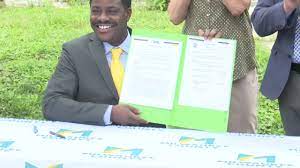MILWAUKEE, WI – July 11 at 11:30 AM, Milwaukee County Executive David Crowley will sign major legislation approved unanimously by the Milwaukee County American Rescue Plan Act (ARPA) Task Force and the Milwaukee County Board of Supervisors appropriating $19 million to fund affordable housing developments, foreclosure rehabilitation projects and energy assistance programs for residents-in-need.
ARPA Task Force Co-Chairs – County Supervisor Shawn Rolland (District 6) and former United Community Center Executive Director Ricardo Diaz – will join County Executive Crowley and Milwaukee County Housing Division Administrator James Mathy at the bill signing, alongside other county and Wauwatosa leaders and affordable housing advocates.
The Milwaukee County legislation seeks to leverage $15 million in federal ARPA dollars to increase the supply of affordable housing in Milwaukee County, especially its suburban communities. The funds would primarily be used as gap financing for projects that have identified other sources of funding, including Low Income Housing Tax Credits, to be used as leverage.
The action also provides $3 million to rehabilitate tax foreclosed homes in Milwaukee County’s suburbs. Milwaukee County administers all Milwaukee County tax foreclosures located outside the City of Milwaukee through its Office of the Treasurer. The bill’s goal is to ensure that the homes are sold and put back on the tax rolls, and that a vast majority of the homes are targeted for homeownership, specifically for first-time homebuyers and Milwaukee County residents, not out-of-state investors.
Lastly, the legislation provides $1 million to resolve an emergency need in Milwaukee County’s Energy Assistance Program. Milwaukee County continues to receive inadequate funding from the state of Wisconsin to meet the needs of existing households requiring energy assistance. Without these additional resources, Milwaukee County’s two community partners, UMOS and Community Advocates, would be forced to lay off staff this month. Moreover, there would be no crisis funds available for households until the next heating season. This proposal would provide adequate funding to ensure that no cuts occur for the next two program years.





